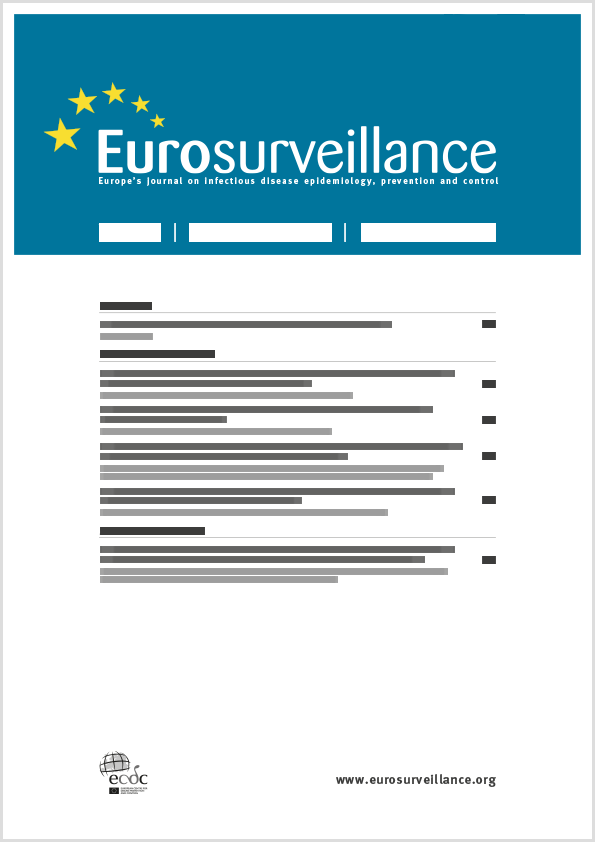- Home
- Eurosurveillance
- Previous Issues
- Volume 26, Issue 36, 09/Sep/2021
Eurosurveillance - Volume 26, Issue 36, 09 September 2021
Volume 26, Issue 36, 2021
- Rapid communication
-
-
-
Understanding a national increase in COVID-19 vaccination intention, the Netherlands, November 2020–March 2021
More LessThe intention to get the COVID-19 vaccine increased from 48% (November 2020) to 75% (March 2021) as national campaigning in the Netherlands commenced. Using a mixed method approach we identified six vaccination beliefs and two contextual factors informing this increase. Analysis of a national survey confirmed that shifting intentions were a function of shifting beliefs: people with stronger intention to vaccinate were most motivated by protecting others and reopening society; those reluctant were most concerned about side effects.
-
-
-
Novel vancomycin resistance gene cluster in Enterococcus faecium ST1486, Belgium, June 2021
More LessWe identified a novel van gene cluster in a clinical Enterococcus faecium isolate with vancomycin minimum inhibitory concentration (MIC) of 4 µg/mL. The ligase gene, vanP, was part of a van operon cluster of 4,589 bp on a putative novel integrative conjugative element located in a ca 98 kb genomic region presumed to be acquired by horizontal gene transfer from Clostridiumscidens and Roseburia sp. 499. Screening for van genes in E. faecium strains with borderline susceptibility to vancomycin is important.
-
- Top
-
- Research
-
-
-
Spotlight influenza: Estimation of influenza vaccine effectiveness in elderly people with assessment of residual confounding by negative control outcomes, Finland, 2012/13 to 2019/20
More LessBackgroundCohort studies on vaccine effectiveness are prone to confounding bias if the distribution of risk factors is unbalanced between vaccinated and unvaccinated study subjects.
AimWe aimed to estimate influenza vaccine effectiveness in the elderly population in Finland by controlling for a sufficient set of confounders based on routinely available register data.
MethodsFor each of the eight consecutive influenza seasons from 2012/13 through 2019/20, we conducted a cohort study comparing the hazards of laboratory-confirmed influenza in vaccinated and unvaccinated people aged 65–100 years using individual-level medical and demographic data. Vaccine effectiveness was estimated as 1 minus the hazard ratio adjusted for the confounders age, sex, vaccination history, nights hospitalised in the past and presence of underlying chronic conditions. To assess the adequacy of the selected set of confounders, we estimated hazard ratios of off-season hospitalisation for acute respiratory infection as a negative control outcome.
ResultsEach analysed cohort comprised around 1 million subjects, of whom 37% to 49% were vaccinated. Vaccine effectiveness against laboratory-confirmed influenza ranged from 16% (95% confidence interval (CI): 12–19) to 48% (95% CI: 41–54). More than 80% of the laboratory-confirmed cases were hospitalised. The adjusted off-season hazard ratio estimates varied between 1.00 (95% CI: 0.94–1.05) and 1.08 (95% CI: 1.01–1.15), indicating that residual confounding was absent or negligible.
ConclusionSeasonal influenza vaccination reduces the hazard of severe influenza disease in vaccinated elderly people. Data about age, sex, vaccination history and utilisation of hospital care proved sufficient to control confounding.
-
- Top
-
- Letter
- Miscellaneous
- Author's correction
-
Volumes & issues
-
Volume 30 (2025)
-
Volume 29 (2024)
-
Volume 28 (2023)
-
Volume 27 (2022)
-
Volume 26 (2021)
-
Volume 25 (2020)
-
Volume 24 (2019)
-
Volume 23 (2018)
-
Volume 22 (2017)
-
Volume 21 (2016)
-
Volume 20 (2015)
-
Volume 19 (2014)
-
Volume 18 (2013)
-
Volume 17 (2012)
-
Volume 16 (2011)
-
Volume 15 (2010)
-
Volume 14 (2009)
-
Volume 13 (2008)
-
Volume 12 (2007)
-
Volume 11 (2006)
-
Volume 10 (2005)
-
Volume 9 (2004)
-
Volume 8 (2003)
-
Volume 7 (2002)
-
Volume 6 (2001)
-
Volume 5 (2000)
-
Volume 4 (1999)
-
Volume 3 (1998)
-
Volume 2 (1997)
-
Volume 1 (1996)
-
Volume 0 (1995)
Most Read This Month

-
-
Detection of 2019 novel coronavirus (2019-nCoV) by real-time RT-PCR
Victor M Corman , Olfert Landt , Marco Kaiser , Richard Molenkamp , Adam Meijer , Daniel KW Chu , Tobias Bleicker , Sebastian Brünink , Julia Schneider , Marie Luisa Schmidt , Daphne GJC Mulders , Bart L Haagmans , Bas van der Veer , Sharon van den Brink , Lisa Wijsman , Gabriel Goderski , Jean-Louis Romette , Joanna Ellis , Maria Zambon , Malik Peiris , Herman Goossens , Chantal Reusken , Marion PG Koopmans and Christian Drosten
-
- More Less


